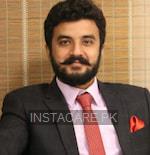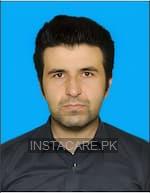Occipital Neuralgia - Symptoms, Risk factors and Treatment
Last Updated On Wednesday, February 25, 2026
Occipital Neuralgia in Urdu
Occipital neuralgia ایک ایسی حالت ہے جس میں آپ کے occipital اعصاب سوجن ہو جاتے ہیں جس کے نتیجے میں سر درد ہوتا ہے۔
occipital nerves اعصاب کا ایک گروپ ہیں اور کھوپڑی اور ڈھانچے جیسے کان اور گردن کے اوپری حصے کی جلد وغیرہ کو انرویٹ کرتے ہیں۔
occipital neuralgia کی کیا وجہ ہے؟
Occipital neuralgia اس وقت ہوتا ہے جب occipital nerves (عصبی کمپریشن) پر دباؤ بڑھتا ہے۔ یہ چوٹ یا پٹھوں کی تنگی کی وجہ سے ہوسکتا ہے۔ اس کے علاوہ اعصاب کی جلن (سوزش) بھی occipital neuralgia کا سبب بن سکتی ہے۔
Occipital Neuralgia in English
Occipital neuralgia is a condition in which your occipital nerves get inflamed-resulting in headache.
The occipital nerves are a group of nerves and innervate the scalp and structures such as the ear and skin on the upper neck etc.
What causes occipital neuralgia?
Occipital neuralgia occurs when there is increased pressure on the occipital nerves (nerve compression). It could occur due to injury or muscle tightness. Other than that, irritation of the nerves (inflammation) can also cause occipital neuralgia.
Causes of nerve compression:
- Trauma such as road traffic accident or fall
- Muscle tightness
- Cervical disc degeneration
- Tumors in the neck
Causes of inflammation:
- Infections
- Vasculitis (inflammation of the blood vessels)
There are some health conditions found to be associated with occipital neuralgia such as:
- Gout
- Diabetes
- Osteoarthritis
Symptoms of occipital neuralgia:
Pain:
Pain is the primary symptom of occipital neuralgia.
The pain is generally severe in intensity and occurs at the back of the head and neck. It is sharp and throbbing in character and feels like electric shocks that may aggravate by moving your head or brushing your hair. It may radiate to the scalp and can be felt behind the eyes too.
Photosensitivity:
Other than pain, patients having occipital neuralgia may experience increased sensitivity to light (photosensitivity).
Differentiating occipital neuralgia from migraine:
Due to their similar presentations, occipital neuralgia is often mixed up with a migraine. Both conditions need different treatment, so proper diagnosis is important. Some of the features that differentiate occipital neuralgia from migraine headache are:
Severe pain in occipital neuralgia lasts for a short amount of time, for a few seconds, whereas migraine lasts longer.
The pain of occipital neuralgia is sharper and stabbing in character than migraine- which is throbbing, like occipital neuralgia, but dull than the latter.
Migraine is associated with other symptoms such as redness of the eyes and increased tears, while occipital neuralgia does not show such features.
Diagnosis of occipital neuralgia:
Occipital neuralgia is generally diagnosed by a history and a physical exam. Your doctor may ask you questions related to any history of head trauma. In a physical exam, your doctor may press firmly on the occipital area (back of the head) to check if you experience pain from this. Other than that, imaging tests such as an MRI or CT scan can be suggested to reach a diagnosis. Another option to make a diagnosis is the occipital nerve block, in which a doctor gives you an injection that numbs the occipital nerve to see if there is pain relief after that.
Treatment of occipital neuralgia:
Treatment of occipital neuralgia includes:
- Warm compress
- Massage
- Physical therapy
Medications like:
- Muscle relaxants
- Anti-inflammatory medications
- Antidepressants
- Nerve block injections
In rare cases, your doctor may suggest surgery for treating occipital neuralgia.
Conclusion
Occipital neuralgia is a condition in which your occipital nerves get inflamed-resulting in headache. This headache can resemble other forms of headache such as migraine and cluster headache, and the right diagnosis is essential for the right treatment.
Occipital neuralgia is not a serious condition and mostly gets resolved by the right treatment. Resting can help make occipital neuralgia better. If you notice any signs and symptoms mentioned above, it is advisable to see your healthcare provider.







